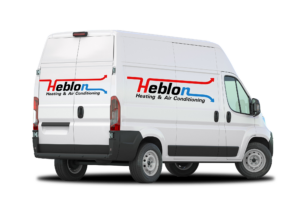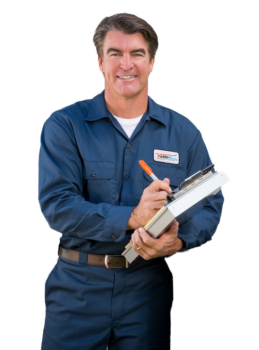Health is central to your well-being. It’s why we see the doctor when we’re sick, eat balanced meals every day and go to the gym. It’s also why we change the filters in our home on time. Your air filters directly impact your home’s Indoor Air Quality (IAQ), and your IAQ can directly impact your health.
The Importance of Air Filters and Indoor Air Quality
Air filters catch the dust, microorganisms and other irritants from the air, and stop them from cycling through your home. If inhaled regularly, these pollutants can negatively affect your immune and respiratory systems, making you sick. This is why it’s so important to change your air filters!
Obviously, filters are important. But with so many new “upgraded” filters to choose from, which one is actually the best? Heblon Heating & Air Conditioning has you covered! We’re here to explain the differences and benefits of two main filters: HEPA and MERV.
What is a HEPA Filter?
Probably the best-known filter, HEPA filters are the standard for a reason. Filters need to have a reduction capability of 99.7% and filter out particles as small as 0.3 microns to be HEPA compliant.
Main Features
True HEPA filters have gone through testing to receive certifications for their efficiency. These mechanical filters must meet the 0.3 micron particle filtration standard to earn a True HEPA title.
While the air passes through the filter and hits the HEPA material, some particles are naturally pulled to the fibers and others get trapped in the fiber contours. In air purification solutions and systems, HEPA material is usually combined with activated carbon material. This addition provides odor control, no matter the source of the odor. It helps with smells from cooking, pets, cleaning products and more.
True HEPA is the only label that comes from successful testing. “HEPA like” or “HEPA type” filters do not meet the high standards that come with the True HEPA label.
Pros of HEPA Filters
- Highest rated air pollutant removal efficiency. True HEPA filters meet or exceed 99.7% of pollution reduction. It also removes ultra-fine particles, and no other filter material can trap impurities as small as 0.3 micrometers in size.
- Highest allergen particulate removal efficiency. Allergists and allergy sufferers both trust HEPA filters to purify their home.
- They come in permanent and washable varieties.
- The HEPA filter’s lifespan is typically longer than its competitors.
Cons of HEPA Filters
- If your system does not have a UV light sterilizer, the reduction of bacteria isn’t as effective.
- If your filter does not include activated carbon, odor removal isn’t as effective.
- True HEPA filters are more expensive.
What is a MERV Filter?
MERV stands for Minimum Efficiency Reporting Values, it is a rating scale for the filters efficiency of air pollution reduction. The scale’s value goes from 1 through 20. The higher rating means that the filter’s ability to catch pollutants is higher and the particles it can catch are smaller.
Main Features
The scale values show what percentage of particles the filter can catch. The particles measured range from 10 to 0.3 micrometers in size. Only high-value MERV filters can remove allergens from the air. High-value filters have fibers layered specifically to catch tiny, allergy-triggering particles.
High-rated material can trap airborne particulate matter (APM) like smoke, dust and liquid droplets. Lower value media does not provide this same benefit. Values are not standard across brands or systems.
Pros of MERV Filters
- The ratings allow for multiple levels of efficiency.
- The American Society of Heating, Refrigerating, and Air Conditioning Engineers (ASHRAE) developed the MERV rating system.
- The American College of Allergy, Asthma & Immunologists (ACAAI) recommends MERV-11 through 13 rated filters for people with allergies. These filters aren’t as effective as HEPA, but they can trap most airborne allergenic particulate matter.
- The testing required for ratings is near flawless. It tests for removal efficiency of particles from 0.3 to 10 microns large, and that produces its MERV value.
Cons of MERV Filters
- Filter maintenance is very precise. If there are any missed steps or oversights, the filter can easily clog and affect the airflow of your HVAC system.
- You need at least a MERV-11 filter if you want to control allergens. These filters are more restrictive and can also affect your HVAC system’s airflow.
- As the filter rating rises and improves pollutant removal efficiency, it also can lower your HVAC system’s performance.
Which is Better: MERV or HEPA?
Most homeowners want the best for their home and family, so which filter is the best choice? The answer isn’t as simple as a definite ranking. Both standards are important, but they’re best suited for different systems and different families.
While MERV filters offer varying levels of filtration, you need to use a guide to find which is best suited for you. To remove finer dust particles, you’ll need a MERV rating of 8 to 12. But, to control allergens, you’ll need at least a MERV-13 filter. We typically use these filters in air conditioners and dehumidifiers.
HEPA filters can remove any air pollutant, even those as small as 0.3 micrometers. For this reason, HEPA filters are usually the best option for anyone with allergies. The HEPA standard is most often seen in air purifiers and vacuum filters.
Professional Indoor Air Quality Solutions For Your Home
You take care of your lawn by cutting and watering it and you take care of your appliances by cleaning them, but what about your home’s air? Just like any other part of your home, you need to take care of your air! That’s why Heblon Heating & Air Conditioning provides premier home air purification solutions to Meridian homeowners.
Whether you need an IAQ test, a new air purifier or HVAC services, you can always call on Heblon!





